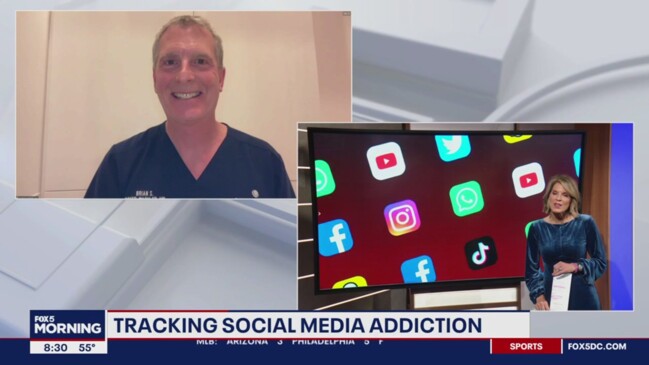Are you fed up feeling like your phone has a grip on your life that won’t let go?
Researchers in France definitely are.
The European nation is making serious moves towards regulating smartphone use for children after a landmark report deemed them “victims” of a technological revolution that has sought to turn them into “merchandise”.
Almost two decades from the initial release of the iPhone, smart devices have completely and utterly transformed how the developed world interacts with itself.
Untold millions of people are interfacing with unimaginably powerful devices from the moment we wake up and then consistently throughout the day.
Research conducted by RedSearch found that Aussies are spending a whopping 6.8 hours a day browsing online on average, with 97 per cent of Australian internet users aged 16-64 having smartphones.
It goes without saying that the convenience of smartphones has made aspects of life easier, especially for people working in fast-paced digital environments.
Our ability to immediately connect with anyone across the globe in any language has broken down archaic communications barriers, and just about everyone has near-instant access to crucial information, like how to perform CPR in a pinch.
It has also made it easier to pay for things, organise our schedules and, if you’re a very bad person, cheat at pub trivia.
But major tech companies, like any other giant corporations, have a religious dedication to the bottom line.
As more apps emerge, major players are ramping up their tactics to compete for our attention via increasingly addictive features that are specifically designed to keep you hooked.
Talk to anyone under 40 and chances are they’ll tell you they’re a slave to Instagram reels, which are now becoming rapidly specialised and in-tune with every individual user to feed them exactly what they want.
Other major platforms like YouTube have also adopted the endless content-carousel model and similarly tailor content to each user, with a sprinkling of advertisements strung in between.
The problem is, if adults are struggling to keep their digital addictions in check, how on Earth do we expect children will react?
The widespread availability of social media apps and their effects on mental health in youth has been well-documented for years and the results aren’t pretty.
Glorifications of fame, beauty and wealth have naturally rocketed to the top of algorithms across TikTok, Instagram and similar time-sapping apps, wreaking havoc on developing minds who are being conditioned to believe they’re simply not good enough unless they have perfect skin, a Ferrari and thousands of “followers”.
And that’s just the bait.
The bigger fish is in how these apps influence our spending behaviour, with retailers forking out more than ever to get their products in front of social media audiences across the globe.
The report, commissioned by French President Emmanuel Macron, says there is now an undeniable need to shield children from the profit-driven tactics employed by tech companies.
The report criticises the “strategy of capturing children’s attention, using all forms of cognitive bias to shut children away on their screens, control them, re-engage them and monetise them”.
“We want [the industry] to know we’ve seen what they’re doing and we won’t let them get away with it,” the report added.
Neurologist Servane Mouton criticised the “techno-ference” getting in the way of developing minds, claiming parents who regularly check their phones while feeding their children are emotionally stunting them.
“Before the age of six, no child needs a screen in order to develop,” Mr Mouton said. “In fact, screens can stop them developing properly at this age.”
The report argues that any device given to a child aged between 11 and 13 should be unable to access the internet and that 15-year-olds should only be able to access what it called “ethical” social media platforms.
It controversially argues that TikTok, Instagram and Snapchat should not be available to teenagers until they reach adulthood.

Amine Benyamina, head of the psychiatry and addiction service at Paul-Brousse hospital, said the devices we own should be primarily serving us and not the interests of profiteering tech executives.
“Tech is and will remain a fantastic tool, but it has to act in people’s service, not people being reduced to serving a product,” he said, adding that children had their “eyesight, their metabolism, intelligence, concentration and cognitive processes” impacted by extended use.
“Algorithms that re-engage and stimulate the pleasure system and are built to avoid you losing interest in the content have a type of addictive dynamic.”
Of course, the implementation and policing of these suggested policies will be almost impossible, but the experts have made it clear just how damaging an early addiction to social media can be on our lives.
President Macron has remained vague about the way ahead, claiming earlier this year that “there might be bans, there might be restrictions”.
The report came as TikTok announced the suspension of a feature in its spin-off TikTok Lite app in France and Spain. TikTok Lite rewards users for watching and liking videos, a feature that prompted the European Union to launch a probe.
The popular video-sharing social media platform, owned by Chinese company ByteDance, said the suspension would remain “while we address the concerns that they have raised”.
The European Commission’s top tech enforcer, Thierry Breton, said the EU investigation would continue, stating: “Our children are not guinea pigs for social media.”
TikTok Lite arrived in France and Spain — the only EU countries where it is available — in March.
Users aged 18 and over can earn points to exchange for goods like vouchers or gift cards through the app’s rewards program.
TikTok Lite is a smaller version of the popular TikTok app, taking up less memory in a smartphone and made to perform over slower internet connections.
The European Commission on Monday announced an investigation into TikTok Lite, and threatened to have the rewards program suspended, raising concerns about the risk to users’ mental health.
The commission demanded TikTok provide more information by a Wednesday deadline, along with any defence against the threatened suspension.
Breton said in a statement that “our cases against TikTok on the risk of addictiveness of the platform continue”.
“We suspect that this (rewards) feature could generate addiction and that TikTok did not do a diligent risk assessment and take effective mitigation measures prior to its launch,” he said.
The probe is the EU’s second against TikTok under a sweeping new law, the Digital Services Act (DSA), that requires digital firms operating in the 27 nations to effectively police online content.
In February, the commission opened a formal probe into TikTok over alleged violations of its obligations to protect minors online.
